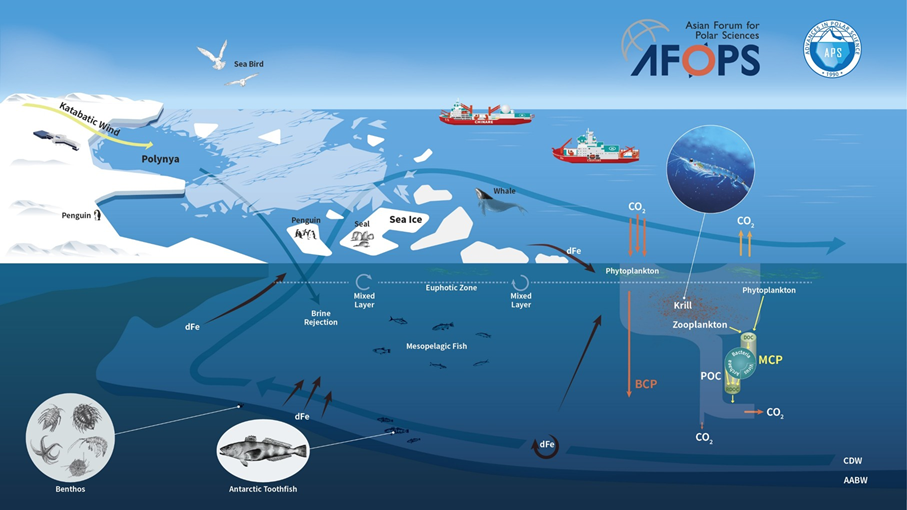



The polar regions, as critical areas in the Earth's climate system with high sensitivity and amplification effects, are undergoing the most significant environmental changes worldwide. Data from a bulletin released by the World Meteorological Organization (WMO) in 2025 shows that the warming rate in the Arctic has risen to four times the global average. Additionally, a report in Nature in July 2025 highlighted a sharp decline that Antarctic sea ice extent since 2014, with 2023 setting a record low — the sea ice coverage in July of that year was more than 7 standard deviations below the average from 1981-2010 average, and the magnitude of this change far exceeds the range of natural fluctuations over the past 300 years.
These dramatic environmental changes are profoundly reshaping the structure and function of polar ecosystems. Taking the Antarctic ecosystem as an example, over the past 26 years, the productivity of diatoms in the Southern Ocean has significantly decreased by 18%. Meanwhile, the abundance of phytoplankton groups under less grazing pressure has increased by 6% - 10%. This shift in the community structure of phytoplankton across the Southern Ocean has triggered cascading impacts on the survival and development of krill populations. Meanwhile, the retreat of sea ice and changes in bottom water temperature are significantly affecting the habitat of macrobenthos, whose diversity and community structure changes are increasingly becoming important indicators for assessing the health of polar ecosystems.

The Ross Sea Ecosystem (source: Dr. Wei Luo)
To systematically sort out and present the latest research achievements of Asian countries in the cutting-edge scientific research field of "Climate System Changes and Polar Ecosystems", and to further promote interdisciplinary academic exchanges and international cooperation, Advances in Polar Science (APS) plans to launch a special issue under the same theme. The journal is honored to invites Senior Researcher Yong Yu (Polar Research Institute of China), to serve as the guest editor for the AFoPS special issue " Response of Polar Ecosystems to Climate System Changes".
APS is an international, peer-reviewed and open-access journal sponsored by the Polar Research Institute of China (PRIC) and Chinese Society for Oceanography (CSO). Since 2015, APS has become more truly international, and been improving, with its inclusion in Elsevier’s Scopus, the largest abstract and citation database of peer-reviewed literature in May of 2020. Articles published on APS are free of charge with generous funding from PRIC. APS pays particular attention to publishing original papers from early career scientists through providing language polishing services. For more details, please visit APS website: aps.chinare.org.cn This special issue will be published in March 2027, as the general issue (Vol. 38, No. 1) of APS. As this will be a scheduled special issue, there will be strict adherence to the following deadlines. June 30, 2026 — deadline for submitting abstracts of possible contributions; August 15, 2026 — deadline for submitting a manuscript for this issue; November 15, 2026 — deadline for submission of the final accepted manuscript;
December 30, 2026 — estimated online publication date; March 30, 2027 — publication date.
Submission Instructions: (1) Manuscripts should be original and unpublished works, complying with the principles of academic integrity. (2) Article types include Articles (research papers), Reviews, Opinion-Editorials (commentaries), Trends & Letters, etc. (3) The limit extension for each manuscript is of 15 pages (about 10,000 words). (4) Please prepare your manuscript according to the APS’s submission guidelines.
The themes of the special issue include, but are not limited to:
(1) Changes in the polar climate system and their impacts on ecosystems.
(2) Adaptive strategies and evolutionary dynamics of polar biotic communities in response to climate system changes.
(3) Feedback interactions and regulatory mechanisms between polar carbon cycle processes and the climate system.
(4) Technological innovations (such as observation equipment, data analysis technologies, etc.) and observation method optimization in polar ecology and climate research.
We sincerely invite you to contribute to the AFoPS special issue.
Guest Editors:
Senior Researcher, Yong YU (Polar Research Institute of China, CHINA),
Professor. Dr. Clement Michael WONG(Universiti Malaysia Sabah,MALAYSIA)
Scientist-In-Charge, Dr. Anand JAIN (National Centre for Polar and Ocean Research, INDIA)
Principle Investigator, Dr. Cong ZENG (Shanghai Jiao Tong University, CHINA)
Principle Investigator, Dr.Yuanyuan FENG (Shanghai Jiao Tong University, CHINA)
Editorial Office:
Contact to Dr. Sai Zhang
Tel: 086-21-58713642, 58713650
Email: journal@pric.org.cn
Online Submission: https://aps.chinare.org.cn